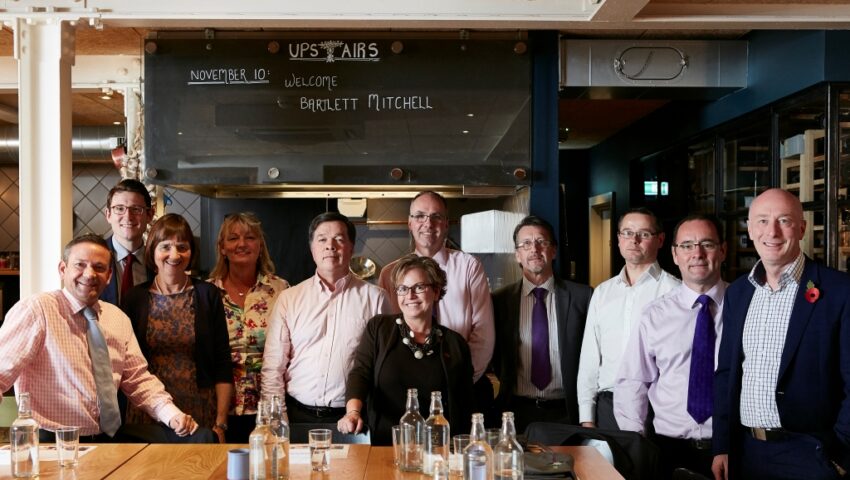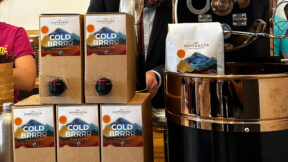News
Experts call for more ring-fencing of catering as part of wider FM strategy

Catering is emotive and needs to be ring-fenced from other FM services as part of a wider FM strategy, according to a panel of leading experts from the food and facilities management industry.
The panel, which included high-profile consultants operating in the workplace, healthcare, education, and leisure sectors, also concluded that catering plays a huge role in influencing productivity and should be an integral part of any company’s wellbeing and FM strategy.
Hosted by bartlett mitchell, one of the UK’s leading independent caterers, the roundtable discussion aimed to identify key issues facing catering and FM businesses over the coming year.
Chaired by Ian Thomas, CEO at bartlett mitchell, the panel also discussed how catering can support recruitment and retention, enhance brand value and facilitate better collaboration in the workplace.
How catering fits as part of wider FM strategy
Thomas said: “People are far more educated about food these days which can make it a very emotive issue. They understand how dishes are made, what produce is used and the impact it can have on their bodies. This makes them better placed to make a judgment on food than most other FM services. It’s incredibly important for businesses to ensure that they have the right offer as part of their workplaces and buildings and consider it as part of their overall FM strategy.”
He added: “Businesses are also very aware of how brand perception can impact performance and productivity. This is why we are seeing so much focus on creating and developing collaborative and engaging environments. Employers know that prospective employees are looking for more than just a salary.
“In addition, catering as part of TFM means it can sometimes become commoditised, which could result in the loss of focus and create potential reputational risk.”
Chris Stern, managing director, Stern Consultancy, added: “Catering is one of the only services clients’ personnel have to pay for directly. This in itself means that an additional level of scrutiny is applied when making a judgement on its quality. That’s why, on most occasions, there should be extra consideration given to using specialist catering providers as part of an overall FM tender.”
Julian Fris, director of the facilities management consultancy, Neller Davies, said: “It’s important for FM leads to look at their catering offer as more than just another service line. It can be utilised to aid broader wellness objectives, as well as create commercial and reputational currency amongst its employees and other stakeholders. Whilst there will always be debate and discussion around using specialist vs TFM providers, it’s important to note that there is no one size fits all solution.”
The meeting was held at Trinity in Clapham, the recently Michelin-starred restaurant owned by Adam Byatt. Byatt is chef consultant at bartlett mitchell.
The roundtable discussion covering catering and FM strategy focussed on five key areas listed below.
Attracting the best people
- Clients are seeing catering as a strong incentive for talent
- Even with a subsidy, catering is still seen as a very cost effective employee benefit
- Specialist caterers will attract catering staff who are more passionate about their foo
Improving productivity
- Feeding people well enhances their wellbeing, energy and productivity
- Catering can be a great tool to keep people engaged in their work and in the office. It can also support companies who are keen to create separation between work and time away from their desks
- Health and wellbeing is key although businesses must have the right offer – there are examples where sales have dropped when healthy food is ‘pushed’ onto consumers
Enhancing your reputation
- Everyone has an opinion on catering as customers are far more educated about food (i.e. TV chef influence)
- Great hospitality remains at the heart of any business and enhances the guest experience
- Customer don’t need to know anything about M&E (it’s an expected – i.e. lights turning on), catering is different
- Specialist caterers can react faster to trends as they are dedicated to future innovations in food and service only, not multiple services
- Catering as part of TFM can become commoditised, which means focus can be lost and is at risk of reputational implications.
Providing return on investment
- There has been a shift away from ‘hospitality’ dining as working patterns have changed. People are moving out of meeting rooms, to shared spaces/breakout areas
- Loos vs. food – perception is that the consumer wants a specialist provider to offer food and production, not from the same company which may be cleaning the bathrooms
- It’s important to balance the immediate cost saving TFM can bring vs. the long-term and sustainable value from a specialist service
- Street food is still a driving trend although the challenge is to re-create the spaces to be authentic to drive consumer traffic (i.e. shifting from canteen to authenticity)
- Specialists caterers will have the experience and insight to react appropriately to feedback/surveys
Collaboration
- More people are using catering to bring people into a common space to collaborate
- Most contributors were in agreement that specialist caterers need to engage better with the C-Suite, and more specifically HR, to better understand the cultural objectives from the catering strategy/policy
- There is too much jargon which is not understood, largely around financials, so engagement with FM and procurement teams to raise knowledge and reflect known language is important




